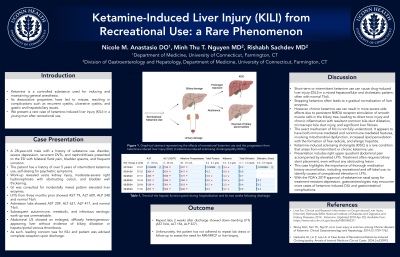Monday Poster Session
Category: Liver
P3048 - Ketamine-Induced Liver Injury (KILI) From Recreational Use: A Rare Phenomenon
Monday, October 28, 2024
10:30 AM - 4:00 PM ET
Location: Exhibit Hall E

Has Audio
- NA
Nicole M. Anastasio, DO
University of Connecticut Health Center
Farmington, CT
Presenting Author(s)
Nicole M. Anastasio, DO, Minh Thu T.. Nguyen, MD, Rishabh Sachdev, MD
University of Connecticut Health Center, Farmington, CT
Introduction: Ketamine, primarily used for anesthesia, can cause complications like recurrent cystitis, ulcerative cystitis, and gastrointestinal issues due to misuse. Here, we present a rare case of ketamine-induced liver injury (KILI) in a young man with chronic recreational use.
Case Description/Methods: A 28-year-old male presented with bilateral flank pain. He endorsed chronic, intermittent ketamine use for five years to manage his depression. GI was consulted for incidentally elevated liver enzymes. Labs from three months prior were AST 79, ALT 609, ALP 248, and normal T-bili. Liver chemistries have been fluctuating since then, with admission labs showing AST 209, ALT 631, ALP 417, and normal T-bili. Subsequent autoimmune, metabolic, and infectious serologic work-up yielded unremarkable results. Abdominal ultrasound showed an enlarged, diffusely heterogeneous liver without evidence of biliary dilatation or hepatic/portal venous thrombosis.
Liver enzyme elevations preceded several courses of antibiotics, including nitrofurantoin and ciprofloxacin, for UTIs. No other over-the-counter medications or herbal supplements were reported. Thus, the primary concern was KILI and the patient was advised complete cessation. Repeat labs two weeks post-discharge showed decreasing liver enzymes (AST N/A due to hemolysis, ALT 156, ALP 327, normal T-bili). Unfortunately, the patient has not complied with subsequent lab draws or clinic follow-up.
Discussion: Short-term or intermittent ketamine use can cause KILI with a mixed hepatocellular and cholestatic pattern with normal bilirubin levels. Ketamine cessation can lead to gradual normalization of liver enzymes without lasting effects. Chronic ketamine use can result in severe side effects due to persistent NMDA receptor stimulation in the biliary tree, causing direct toxic injury, chronic inflammation, fibrosis, and impairment of the sphincter of Oddi.
Ketamine-induced sclerosing cholangitis (KISC) is a rare condition resulting from intermittent or chronic ketamine use. It typically presents with right upper quadrant abdominal pain and elevated liver enzymes. Treatment often involves biliary stent placement, regardless of the presence of an obstructing lesion. This case emphasizes the need for thorough medication history reconciliation to identify the cause of unexplained liver enzyme elevations. With the approval of esketamine nasal spray for treatment-resistant depression in 2019, physicians may see more KILI and other gastrointestinal complications.
Disclosures:
Nicole M. Anastasio, DO, Minh Thu T.. Nguyen, MD, Rishabh Sachdev, MD. P3048 - Ketamine-Induced Liver Injury (KILI) From Recreational Use: A Rare Phenomenon, ACG 2024 Annual Scientific Meeting Abstracts. Philadelphia, PA: American College of Gastroenterology.
University of Connecticut Health Center, Farmington, CT
Introduction: Ketamine, primarily used for anesthesia, can cause complications like recurrent cystitis, ulcerative cystitis, and gastrointestinal issues due to misuse. Here, we present a rare case of ketamine-induced liver injury (KILI) in a young man with chronic recreational use.
Case Description/Methods: A 28-year-old male presented with bilateral flank pain. He endorsed chronic, intermittent ketamine use for five years to manage his depression. GI was consulted for incidentally elevated liver enzymes. Labs from three months prior were AST 79, ALT 609, ALP 248, and normal T-bili. Liver chemistries have been fluctuating since then, with admission labs showing AST 209, ALT 631, ALP 417, and normal T-bili. Subsequent autoimmune, metabolic, and infectious serologic work-up yielded unremarkable results. Abdominal ultrasound showed an enlarged, diffusely heterogeneous liver without evidence of biliary dilatation or hepatic/portal venous thrombosis.
Liver enzyme elevations preceded several courses of antibiotics, including nitrofurantoin and ciprofloxacin, for UTIs. No other over-the-counter medications or herbal supplements were reported. Thus, the primary concern was KILI and the patient was advised complete cessation. Repeat labs two weeks post-discharge showed decreasing liver enzymes (AST N/A due to hemolysis, ALT 156, ALP 327, normal T-bili). Unfortunately, the patient has not complied with subsequent lab draws or clinic follow-up.
Discussion: Short-term or intermittent ketamine use can cause KILI with a mixed hepatocellular and cholestatic pattern with normal bilirubin levels. Ketamine cessation can lead to gradual normalization of liver enzymes without lasting effects. Chronic ketamine use can result in severe side effects due to persistent NMDA receptor stimulation in the biliary tree, causing direct toxic injury, chronic inflammation, fibrosis, and impairment of the sphincter of Oddi.
Ketamine-induced sclerosing cholangitis (KISC) is a rare condition resulting from intermittent or chronic ketamine use. It typically presents with right upper quadrant abdominal pain and elevated liver enzymes. Treatment often involves biliary stent placement, regardless of the presence of an obstructing lesion. This case emphasizes the need for thorough medication history reconciliation to identify the cause of unexplained liver enzyme elevations. With the approval of esketamine nasal spray for treatment-resistant depression in 2019, physicians may see more KILI and other gastrointestinal complications.
Disclosures:
Nicole Anastasio indicated no relevant financial relationships.
Minh Thu Nguyen indicated no relevant financial relationships.
Rishabh Sachdev indicated no relevant financial relationships.
Nicole M. Anastasio, DO, Minh Thu T.. Nguyen, MD, Rishabh Sachdev, MD. P3048 - Ketamine-Induced Liver Injury (KILI) From Recreational Use: A Rare Phenomenon, ACG 2024 Annual Scientific Meeting Abstracts. Philadelphia, PA: American College of Gastroenterology.
